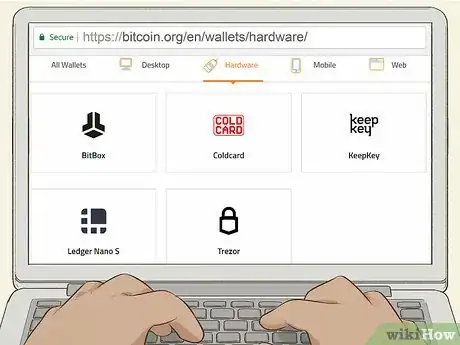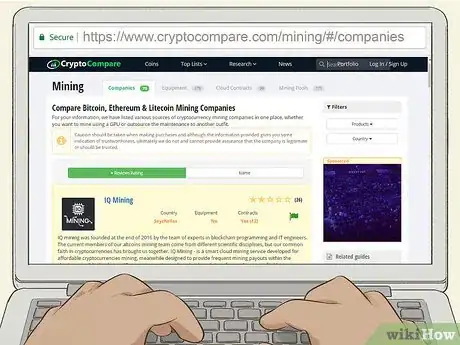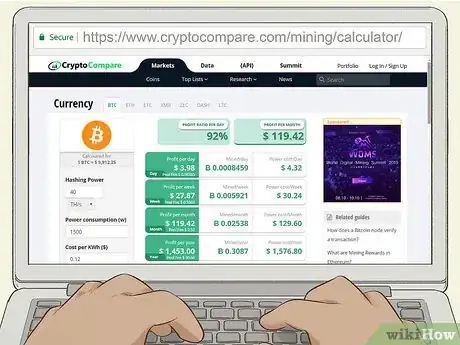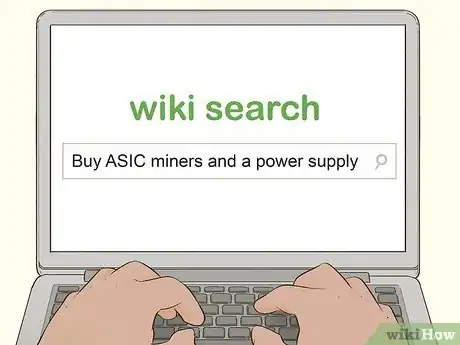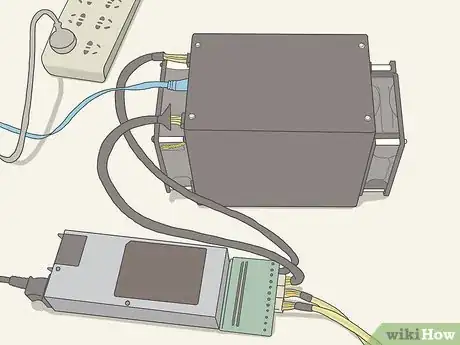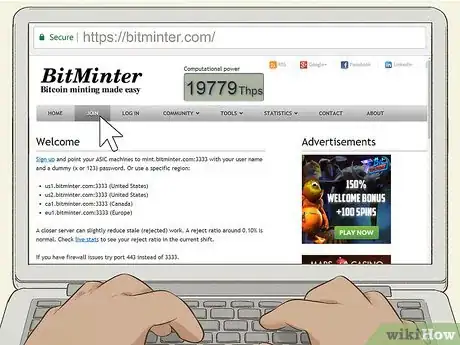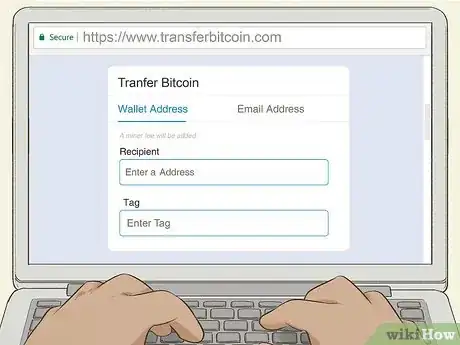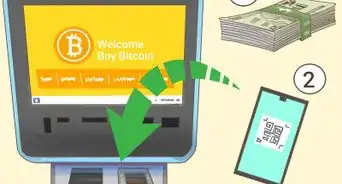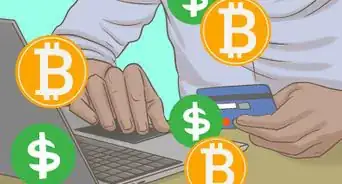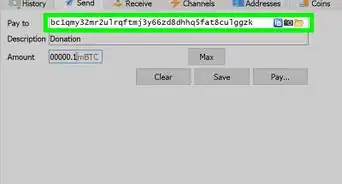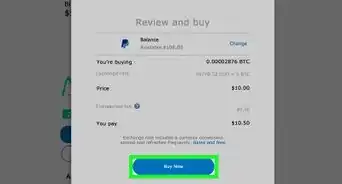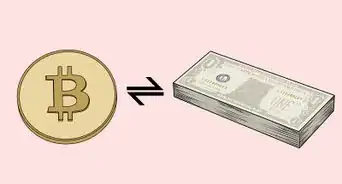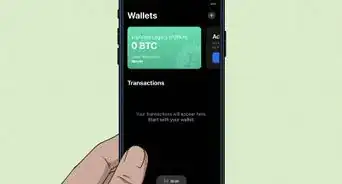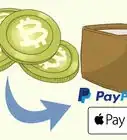This article was co-authored by Vinny Lingam and by wikiHow staff writer, Travis Boylls. Vinny Lingam is and investor and the CEO of Civic Technologies, a blockchain-powered identity protection and management startup. Vinny is known as the 'Bitcoin Oracle' amongst the cryptocurrency community. He was awarded the Top Young ICT Entrepreneur in Africa Award in 2006, was on the World Economic Forum for Young Global Leaders in 2009, and was voted one of the top 500 CEOs in the World in 2015. He is also an investor on Shark Tank South Africa. He has a BS in E-Commerce from the University of South Africa.
There are 7 references cited in this article, which can be found at the bottom of the page.
The wikiHow Tech Team also followed the article's instructions and verified that they work.
This article has been viewed 1,207,608 times.
You've heard of Bitcoin and you're ready to get your hands on some digital wealth. However, this may be easier said than done. When you "mine" Bitcoin, you actually verify Bitcoin transactions in the public, decentralized ledger of Bitcoin transactions (called the blockchain). Every time you find a new block to add to the chain, the system gives you some Bitcoin as a reward. Back in the early days of Bitcoin, it was easy to mine Bitcoin using your own computer. However, as the cryptocurrency has become more popular, it has become all but impossible for individuals to make a profit mining Bitcoin. That doesn't stop a lot of people from trying, though. If you want to mine Bitcoin, you can either sign up with a cloud-mining company or build your own mining rig to mine for yourself.[1]
Steps
Setting Up a Bitcoin Wallet
-
1Download a software or mobile wallet if you're just getting started. Software wallets are kept on your computer, while mobile wallets are apps that you install on your smartphone. Software and mobile wallets are reasonably secure, can be downloaded for free, and are suitable for smaller amounts of Bitcoin.[2]
- You can find a list of secure wallets approved for use with Bitcoin at https://bitcoin.org/en/choose-your-wallet.
- Some wallets are hybrid, meaning that you can access them through software on your computer and through an app on your mobile phone.
-
2Invest in a hardware wallet if you're serious about Bitcoin. Hardware wallets may set you back a couple of hundred dollars but are considered more secure. Since they aren't connected to the internet, they aren't vulnerable to hackers. If you intend to keep your Bitcoin long-term, a hardware wallet is likely a worthwhile investment.[3]
- Trezor and Ledger are two of the more popular hardware wallets available. You can buy them online or at brick-and-mortar stores that sell computer supplies and accessories.
Advertisement -
3Enable all security features on your wallet. Once you've chosen a Bitcoin wallet, set it up for maximum security to protect your Bitcoin. Use two-factor authentication to secure your account. When you log in, a code will be sent to you in a text message or email. You have to enter the code to access your account. This makes your account less vulnerable to hacking.[4]
- Make sure the password you choose is secure and would be difficult for anyone to guess. If you have a password manager on your computer or smartphone, you can use that to create a secure, encrypted password.
Tip: If you have a software or mobile wallet, keep in mind that your wallet is only as secure as the device where it's located. Make sure you have set up robust security on your computer or smartphone, with encryption, a firewall, and up-to-date antivirus protection.
Getting a Cloud-Mining Contract
-
1Decide which cloud-mining service provider to use. There are a number of different cloud-mining service providers available, some of which are better established than others. Each service charges different fees and has different contract packages available.[5]
- Genesis, Hashflare, and Minex are some of the more popular cloud-mining services. However, the most popular services with the best reputations also are frequently sold out of contracts.
- Research services carefully. There have been numerous cloud-mining scams. Make sure the company is legitimate and has a good reputation. You can search the name of the service and see what people are saying online about it. Websites such as CryptoCompare can also help you analyze company reputations. Visit https://www.cryptocompare.com/mining/#/companies to get started.
- Be careful of a cloud-mining service that makes guarantees or claims that sound too good to be true. It is likely a scam. No cloud-mining service can guarantee you a particular rate of return, or guarantee that you'll break even or start turning a profit in a short amount of time.
-
2Pick a cloud mining contract package. With cloud-mining, you essentially lease mining power from a miner farm for a period of time. While your contract is active, you get all the Bitcoin that is mined using that amount of mining power, minus fees paid to the cloud-mining service for maintenance of the mining hardware.[6]
- Contracts typically last from 1 to 3 years, although some last longer. While shorter contracts may carry a lower price tag, it's unlikely that you'll make any money in a shorter period of time. You usually need at least 2 years to break even.
- Prices vary anywhere from under $100 for smaller contracts to several thousand dollars for larger contracts with more mining power – expressed as the hash rate. For example, as of 2019, Genesis offers a 2-year Bitcoin mining contract for $50, which gets you 1 TH/s (1 Tera hash per second, or 1,000,000,000,000 hashes per second). This sounds like a lot, but it's unlikely that you'd do much more than break even in 2 years on such a small plan. At the other end of the spectrum, you could get a 5-year contract for $6,125 with 25 TH/s.
-
3Withdraw your earnings to your secure wallet. When you purchase your contract, your mining power goes to work for you immediately. As you earn Bitcoin, it will show up on your account at the cloud-mining service. When you've accumulated enough, you can send it to your wallet.[7]
- Some cloud-mining services may do regular payouts on an established schedule, such as once a month or once a quarter. Others may allow you to withdraw your earnings any time you want, as long as you have a minimum amount. The minimum can range anywhere from 0.05 BTC to 0.00002 BTC.
Tip: Even if you start making Bitcoin fairly early on in your contract, you still have to cover the price you paid for the contract before you're turning a profit. Most smaller contracts never turn a profit. For larger contracts, it may take you several years.
Using Your Own Hardware
-
1Use an online mining calculator to calculate mining profitability. Mining rigs can be relatively expensive and consume a lot of power. Playing with different setups on an online mining calculator can help you determine whether it's worth it to you to start mining.[8]
- CryptoCompare has a mining calculator available at https://www.cryptocompare.com/mining/calculator/.
- If you're just getting started, you may not have all the information available, such as mining pool fees or power cost. However, the more information you provide, the more accurate the profitability estimate will be.
-
2Buy ASIC miners and a power supply for your mining rig. An ASIC miner is an application-specific integrated circuit (ASIC) designed specifically to mine Bitcoin. Essentially, it's a computer chip that needs a power supply to run it. ASIC miners vary in price depending on their hashing power and their efficiency.[9]
- For example, the Bitmain Antminer S15 has a maximum hash rate of 28 TH/s and consumes 1596W of power. Over the course of a year, you could earn a little under $200 worth of Bitcoin with this miner, depending on the cost of your electricity. However, considering the miner costs between $1500 and $2000, it would still take you at least 7 to 10 years at that rate to start turning a profit, at the Bitcoin price of $4000.
- You can monitor the price of Bitcoin to calculate changes in the time it will take to turn a profit. Profit may also vary based on the price of electricity.
-
3Connect your miner and boot it up. Connect your power supply to your ASIC miner, then connect your miner to your router. Use an ethernet cable to connect your miner – a wireless connection is not stable enough.[10]
- Type your router's IP address in a web browser. This will take you to your router's admin page. Click on "Connected Devices" to find the IP address for your ASIC miner. Copy and paste the IP address for your ASIC miner into your web browser. This will enable you to configure your miner.
Tip: You can access your router and your ASIC miner from any computer or electronic device on the same network as your miner – even your smartphone. Make sure your network is protected by a firewall and a strong password.
-
4Download Bitcoin mining software to a networked computer. After you've connected your hardware, you need to download software so you can mine Bitcoin. There are a number of different mining programs to choose from. Two of the most popular are CGminer and BFGminer. These are both command-line programs, so if you aren't particularly tech-savvy, they may present a challenge for you.[11]
- Most of the mining software that works on Windows will also work on Mac OS X machines.
- EasyMiner has a graphical interface that is more intuitive and easier to use, especially if you're a beginner with limited computer skills. EasyMiner works on Windows, Linux, and Android machines. As of 2019, EasyMiner does not have a Mac OS X version.
-
5Join a mining pool. Mining pools are groups of miners that pool their hashing power to mine Bitcoin more quickly. A pool enables you to compete with massive mining conglomerates that have mining farms with tremendous hashing power. You don't need to pay anything up front to join a mining pool. Instead, the pool takes a percentage of the Bitcoin mined (typically between 1 and 2 percent).[12]
- BitMinter, CK Pool, and Slush Pool are some popular, successful, and well-established mining pools.
- Without a mining pool, you would have to mine potentially for years before you'd see any profit. With a large pool, it's possible that you could start earning Bitcoin within a few months.
-
6Configure your miner to work in your mining pool. Once you've chosen your mining pool and set up a worker account, access your ASIC miner configuration screen and enter the IP address for your mining pool. Then enter the worker name and password you created for the mining pool. When you've entered this information, save your settings.
- As soon as you save your settings, your miner will start working in your mining pool. You can go to your mining pool account to see your status and evaluate your miner's performance. However, keep in mind it may take up to an hour for your mining pool to display your miner's hashing rate.
-
7Transfer any Bitcoin you mine to your secure wallet. As you mine Bitcoin, it will show up in your mining pool account. Your mining pool may have a monthly or quarterly payout schedule, or you may be responsible for manually moving your Bitcoin from your account to your wallet.
- Some mining pools may only allow you to transfer Bitcoin to your wallet once you have a certain amount, typically around 0.001 BTC. You may be able to withdraw smaller amounts for a fee.
Warnings
- Avoid buying a used ASIC miner. They are prone to burnout, and may not last long enough for you to make any profit.⧼thumbs_response⧽
- Cryptocurrencies are volatile. The market value of Bitcoin can and does change frequently. Don't invest any more money in Bitcoin than you can afford to lose.⧼thumbs_response⧽
- Don't try to mine Bitcoin using your own CPU or GPU. While this used to be possible, the blockchain is far too advanced now for this to be a viable option. You'll end up spending more on electricity than you make in Bitcoin, and will likely burn out your computer equipment.[13]⧼thumbs_response⧽
References
- ↑ https://99bitcoins.com/bitcoin-mining/
- ↑ https://www.buybitcoinworldwide.com/mining/software/
- ↑ https://www.buybitcoinworldwide.com/mining/software/
- ↑ https://bitcoin.org/en/secure-your-wallet
- ↑ https://www.bitcoinmining.com/getting-started/
- ↑ https://www.genesis-mining.com/pricing
- ↑ https://www.bitcoinmining.com/getting-started/
- ↑ https://www.investopedia.com/tech/how-does-bitcoin-mining-work/
- ↑ https://www.asicminervalue.com/miners/bitmain/antminer-s15-28th
About This Article
To mine Bitcoins, start by downloading a Bitcoin wallet on your computer or mobile device, which you'll need to store your mined Bitcoins in. Once you have a digital wallet, look for a cloud mining service provider online and sign up for one of their packages to receive processing power to mine Bitcoin remotely. Then, join a mining pool through the provider, which will increase your chances of earning Bitcoins. To learn what equipment you'd need to mine Bitcoin yourself at home, scroll down!

